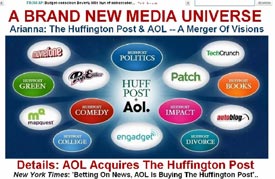March 28 at 8:10 a.m.
Filed under:
Internet,
Media,
Newspapers
By CNN
Beginning at 1 p.m. CST Monday, The New York Times will end free access to its Web site for non-subscribers. In erecting a paywall, executives at the Times are trying to walk a fine line: generate subscription revenue from avid readers willing to pay, while still retaining more the casual customers who boost advertising revenue with their clicks.
Analyzing online readership habits and polling data led the Times to set that fine line at 20 articles every four weeks. Click on fewer and you’ll have free access — but to get article #21, you’ll have to pay up. Get the full story »
By Reuters

The Huffington Post this morning. (Reuters)
AOL Inc. will buy Arianna Huffington’s influential website for $315 million, looking to the high-profile liberal pundit to rescue it from the dustbin of Internet history.
The move comes at a hefty premium. AOL is estimated to pay 32 times earnings before interest, taxes, depreciation and amortization for the Huffington Post, said Benchmark Co analyst Clayton Moran.
Similar content deals, such as Hellman & Friedman’s acquisition of Internet Brands in September 2010, typically go for eight to 12 times earnings, said Moran. Get the full story »
Jan. 25 at 9:40 a.m.
Filed under:
Internet,
Media,
Newspapers
By Reuters
A personalized news service funded by New York Times Co., Washington Post Co ., and Gannett Co. launched Tuesday in an attempt to get readers to pay for online news.
Ongo, which received $12 million in funding from the three newspaper publishers, delivers news from a variety of sources starting at $7 a month. Get the full story »
Dec. 21, 2010 at 11:56 a.m.
Filed under:
Computers,
Internet,
Technology
By Reuters
High-speed Internet has had the greatest technological impact on society over the past decade and is the technology most people say they cannot live without, according to a new poll.
Twenty four percent of 1,950 U.S. adults questioned in the online survey conducted by Zogby International said high-speed Internet had the greatest impact on their lives, followed closely by Facebook at 22 percent and Google with 10 percent.
Of the technologies people say they cannot live without, high-speed Internet came in first at 28 percent and email was second at 18 percent. Get the full story »





